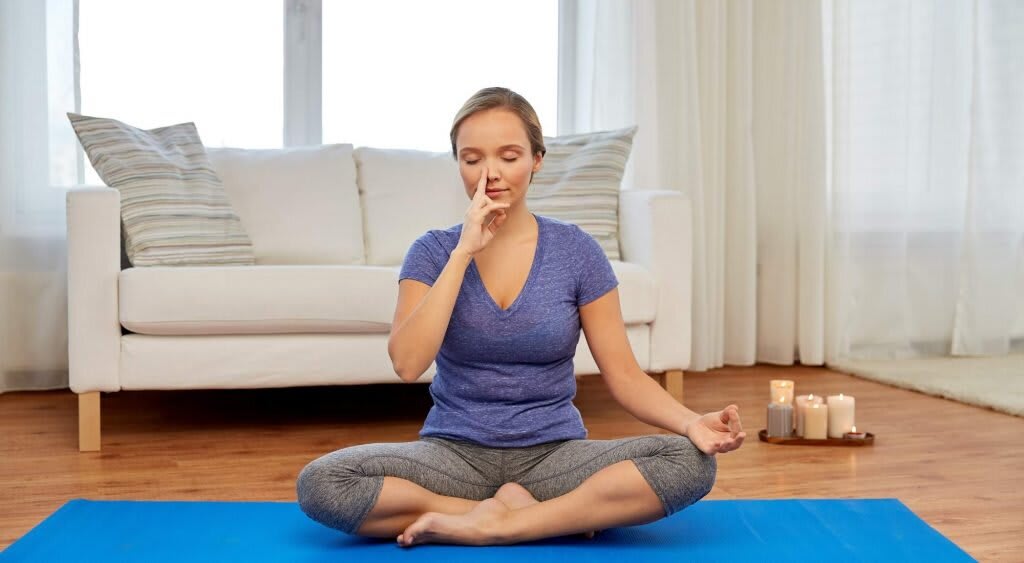Reducing Stress, Blood Pressure, And Depression With Yoga
Breathing Techniques

Improving our health goes beyond just counting calories or tracking exercise. Managing stress is a crucial aspect of overall well-being. Chronic stress has been linked to various health issues such as heart disease, high blood pressure, and depression.
Deep breathing is a simple yet effective way to combat stress and improve chronic health conditions, according to Dr. Yufang Lin from Cleveland Clinic Health System. It's important to remember that breathing exercises should complement, not replace, other medical treatments. Dr. Baxter Bell, a former family doctor turned yoga instructor, highlights the accessibility and empowering nature of breath exercises.
Stress impacts nearly every aspect of our health, with a significant percentage of doctor visits being stress-related. Dr. Philip Barr emphasizes the widespread effects of stress on the body, making it essential to incorporate stress management techniques like deep breathing into our daily routines.
When you're feeling stressed, your body's sympathetic nervous system kicks in, causing symptoms like rapid breathing, increased heart rate, irritability, high blood pressure, anxiety, and muscle tension. This is part of the fight-or-flight response.
Deep breathing helps counteract the sympathetic nervous system by slowing things down. By taking deep breaths and engaging your diaphragm, you can relax your body, lower your heart rate, reduce blood pressure, and release muscle tension.
Deep breathing triggers the vagus nerve, which is part of the parasympathetic nervous system responsible for the body's "rest and digest" functions. This can help you calm down, think more clearly, and feel better overall.
Just like exercise or meditation, incorporating deep breathing into your daily routine can have long-term benefits. So, take a deep breath and give it a try!
1. Reduce Blood Pressure
Individuals dealing with anxiety can effectively reduce their blood pressure by 30 points or more through deep breathing techniques, according to Lin. However, engaging in anxiety-inducing conversations can cause their blood pressure to rise again. For long-term health benefits, including improvements in blood pressure, consistency and regular practice are essential, as highlighted by Lin.
A research paper published in 2019 found that slow breathing exercises led to small reductions in blood pressure. It concluded that breathing exercises may be a first treatment for people with prehypertension or low-risk high blood pressure.
2. Improve Quality of Life in People With Asthma and COPD
Breathing exercises are a nonpharmaceutical way to help people suffering from asthma and COPD. In people with mild to moderate asthma, breathing exercises can help make lungs more efficient and improve oxygen levels.
Although the practice of breathing more deeply and intentionally seems simple enough, the American Lung Association cautions that the exercises may take time to perfect. Start slowly, and don’t first try deep breathing when you are feeling breathless.
3. Manage Symptoms of Depression and Anxiety
Managing symptoms of depression and anxiety can be achieved by addressing chronic stress, which has become more common during and after the COVID-19 pandemic. Dr. Bell highlights that stress can disrupt normal breathing patterns, leading to mental health issues. Engaging in mindful breathing exercises can help restore balance to the breath system, and in the process improving overall well-being. As stress levels decrease due to breathing practices, clarity of thought can improve. A study from 2017 showed that teaching diaphragmatic breathing techniques can lead to lower cortisol levels and increased attention span. Excessive cortisol exposure is linked to a higher risk of depression and anxiety.
4. Alleviate Stress to Reduce Headaches
Taking deep breaths to calm yourself can also assist in easing tension and promoting relaxation, according to Lin. "This can have a positive impact on headaches in various ways. It can alleviate tension in your neck and shoulders, potentially reducing headache discomfort. By being more relaxed, you may find it easier to rest, ultimately leading to feeling better," she explains. While deep breathing may not provide immediate relief during a headache, incorporating it into your routine or at the onset of a headache could prove beneficial, especially when paired with preventive and immediate treatment.
5. Diaphragm Movements Ac Relieve Symptoms of Irritable Bowel Syndrome (IBS)
Breathing deeply can actually help alleviate certain symptoms of Irritable Bowel Syndrome (IBS), according to Megan Elizabeth Riehl, a health psychologist from the University of Michigan. She explains that the diaphragm's movements can help reduce tension in the digestive system, providing relief for issues like constipation, diarrhea, and urgency. A recent study involving adults having symptoms of IBS showed that practicing progressive muscle relaxation and diaphragmatic breathing resulted in positive changes in IBS symptoms, depression, and overall quality of life.
6. Reduce the Frequency and Severity of Hot Flashes
Elevated levels of cortisol, a stress-related hormone associated with the fight-or-flight response, have been connected to hot flashes, a common symptom of menopause, as per a study conducted in 2017.
Hot flashes may also manifest as a side effect of certain cancer treatments. Experts suggest practicing slow and deep breathing exercises at a pace of six to eight breaths per minute as a non-hormonal approach to lessening the intensity or frequency of hot flashes.
About the Creator
Enjoyed the story? Support the Creator.
Subscribe for free to receive all their stories in your feed. You could also pledge your support or give them a one-off tip, letting them know you appreciate their work.





Comments
There are no comments for this story
Be the first to respond and start the conversation.